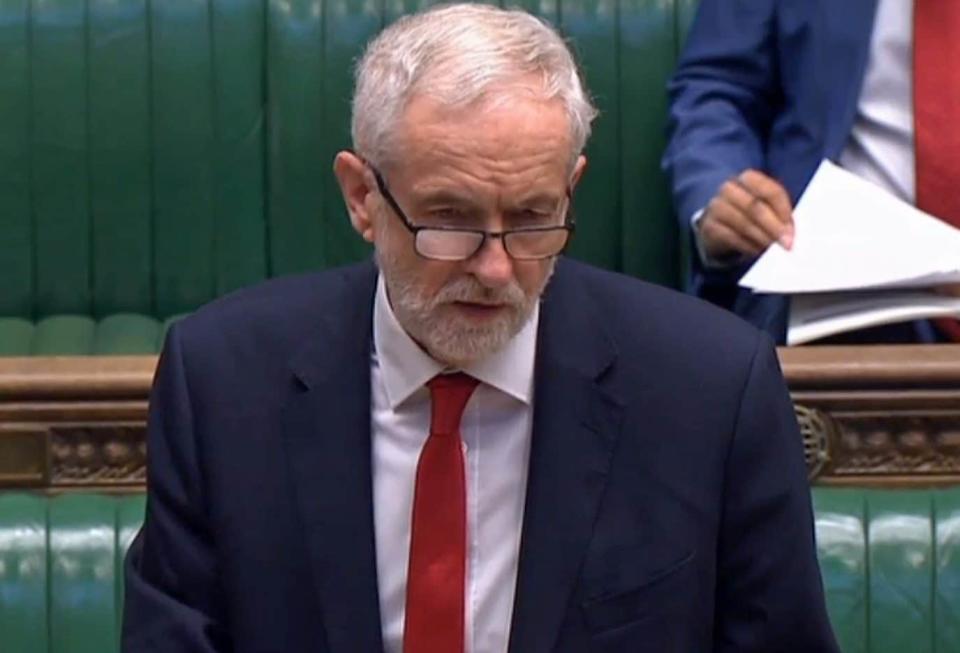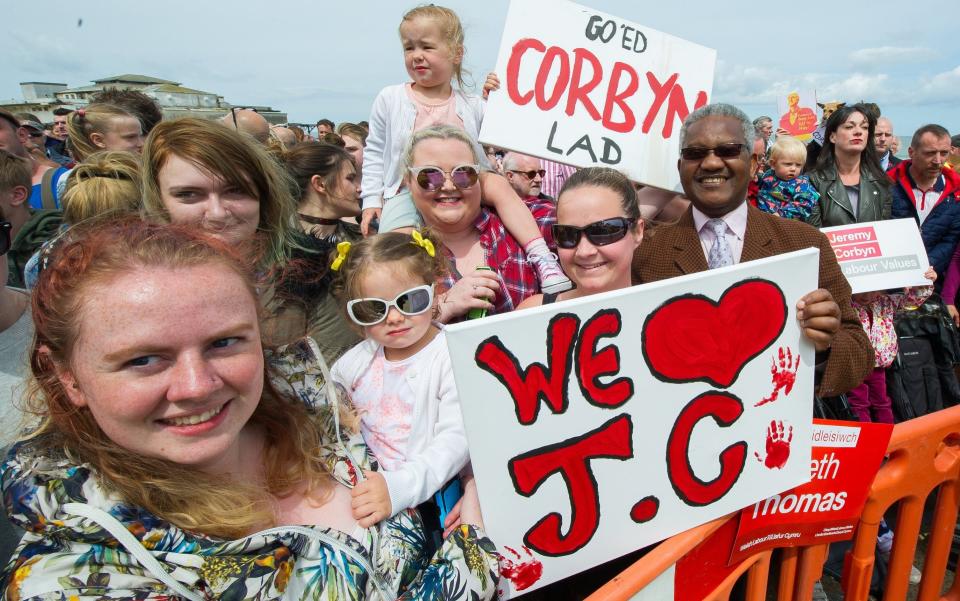Exclusive: Labour must not join national unity Government amid coronavirus crisis, Jeremy Corbyn warns


Labour should not enter a national Government with the Conservatives to get the UK through the coronavirus crisis, Jeremy Corbyn has said in one of his final interviews as the party's leader.
Mr Corbyn also indicated that he would not be going quietly when he stands down after four and a half years in charge on Saturday, saying he would encourage Labour members "to stand up for all the causes that I believe so passionately in".
There has been widespread speculation that Labour should agree to join a coalition with the Tories by jointly appointing ministers to steer the UK's response to the coronavirus pandemic.
However, in comments that could bind the hands of his successor, Mr Corbyn told Friday's edition of Chopper's Politics podcast, which you can listen to on the player above, that Labour had to stay apart from Boris Johnson's Tory Government.
He said: "It's the duty of opposition parties to hold it to account, and that is exactly what we're doing. I think we should be challenging the Government and challenging them on the economic response, challenging them on job security, and that is the way to get better government and better decisions.
"If everybody got together and said: 'We're all absolutely in this together we won't criticise each other', that is a negation of what our democratic society is about."
Sir Keir Starmer, the centrist Labour frontbencher, is widely expected to beat rivals Lisa Nandy and Rebecca Long-Bailey when the results of the Labour leadership contest are announced on Saturday.
Mr Corbyn said he would let the new leader decide whether he was given a frontbench role, adding that he was "happy to work with the party in any way". But in a sign of future battles over the direction of Labour, the outgoing leader – who was propelled into power by a left-wing surge of hundreds of thousands of members – said he would be encouraging activists to keep pressuring the leadership not to drop his policies.
He said: "Ideas live on for ever, and activists live on for ever. I will be doing my best to encourage others to be active and to stand up for all the causes that I believe so passionately in."
Mr Corbyn even hinted that he could return to his days of being a serial rebel as a backbencher. "It depends what the votes are and what the issues are – I always believe in being true to oneself," he added.
The coronavirus crisis had justified many of his left-wing policies, he said, adding it meant that there "if nothing else at least has been a realisation that it is possible to invest in public services and people and you'll actually get a good reward for it".

The Labour party was now in "the middle ground – we're the ones who want social justice", he said, adding: "It doesn't seem very long ago that I was being condemned for wanting to bring the railways into public ownership, to bring in free universal broadband and to reform Universal Credit by bringing back Social Security.
"I was condemned for all of that in the [election] television debates by the very Prime Minister who is now saying it's very important to have the railways into public ownership. Well, I welcome the repentance of a sinner."
Mr Corbyn warned that Britons should prepare for increased national debt to cover the costs of the coronavirus bailout, as well as tax rises.
The 70-year-old said he was feeling "absolutely fine" and not self-isolating despite being in the age group of people judged to be vulnerable to the virus. He added: "I am cycling or walking around but keeping an appropriate distance, and I try to keep myself as fit as I possibly can. I don't smoke, I don't drink, I'm a vegetarian, I eat fresh food, I grow my own vegetables. What else is necessary in life?"
Mr Corbyn had not been able to visit his allotment for the past 10 days but said it was in "good order" and "well manured", although the cold spring meant he had delayed planting his potatoes. He said his fruit trees had been "appropriately pruned by me in December and January" and he would be making blackberry and apple and fig and damson jams later in the year.
Looking back on his time as Labour leader, Mr Corbyn said his "biggest regret" was his election defeat in December, which he blamed on the Tories' "very simplistic" solution to Brexit and "unprecedented" media hostility.
He said: "Obviously, I put everything I could into that campaign. At the end of the day, the differences over Brexit were big within our society and Boris Johnson was offering something very simplistic which he has not yet delivered."
Asked to what extent he had been to blame for the defeat, Mr Corbyn said: "I accept responsibility as leader of the party that I led the party into the election campaign on a unanimous decision as to the contents of the manifesto. We also had an unprecedented level of hostility from a lot of media in 2019 – rather more than in 2017 – and that probably made a difference.

"But I accept responsibility – I led the party. And I don't regret any of the policies we put forward, I'm very proud of the policies we put forward. I do think that it was Brexit that caused the problem.
"And I do think that the relevance of everything we said about redistribution of power and wealth in society is as appropriate now as it was then and will be seen to be even more appropriate as coronavirus plays out."
Mr Corbyn – who had been a Eurosceptic for years before the 2016 referendum on EU membership – justified Labour's election manifesto policy of giving a vote on a renegotiated Brexit deal by saying he had "wanted to ensure that the party came together".
Addressing Labour's apparent inability to tackle anti-Semitism in its ranks, he said: "Anti-Semitism is a uniquely vile form of racism in any form whatsoever. When I became leader of the party, there wasn't a process in place for dealing with allegations of anti-Semitism. [Labour had] set up a process which took far too long to be set up.
"And we do have a robust process in the Labour Party for dealing with allegations of anti-Semitism, and people are suspended or expelled if they are absolutely guilty of anti-Semitic behaviour. And I believe that we've done the right thing on that."
Subscribe to Chopper's Politics, The Telegraph's weekly political podcast, for free here

 Yahoo News
Yahoo News 